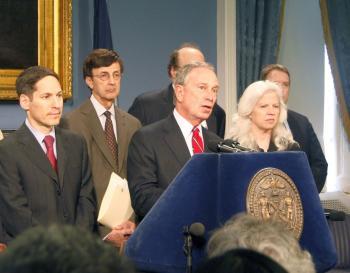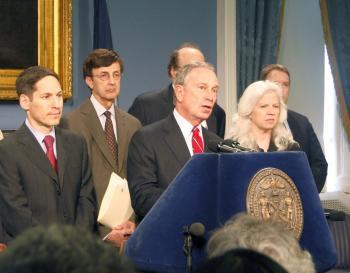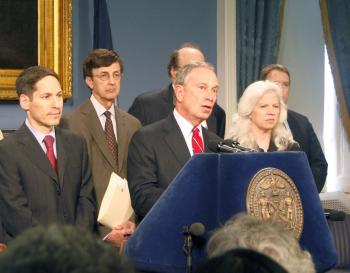NEW YORK—The New York Health Department is investigating a cluster of swine flu at the St. Francis Preparatory School in Queens. As part of the investigation, the Centers for Disease Control and Prevention (CDC) on Monday afternoon confirmed swine flu in an additional 20 people associated with the St. Francis Preparatory School. Eight had already been confirmed as of last Friday. Approximately 140 students were complaining of symptoms.
The total number of cases in New York City stood at 28 as of Monday evening. All of the patients have suffered only minor illness. None have required hospitalization, and nearly all are already improving.
The Health Department has also identified 17 more probable cases within the St. Francis school cluster. Nasal swabs from those patients are undergoing confirmatory testing at the CDC.
Meanwhile the doors at St. Francis Preparatory School where 2,700 students attend were closed, and classes suspended through Tuesday as workers try to eliminate any swine flu that may be inside, thoroughly scrubbing the place with strong disinfectant.
Frederick Jolin, 14, one of the infected students told the Associated Press, “I’m feeling much better than yesterday,” he said. “I think it’s really scary—it’s at a point anybody could get it.”
A similar virus has recently caused 103 deaths in Mexico, but there are no severely ill people in New York City with swine influenza. All of the U.S. patients have fully recovered or are recovering.
The total number of cases in New York City stood at 28 as of Monday evening. All of the patients have suffered only minor illness. None have required hospitalization, and nearly all are already improving.
The Health Department has also identified 17 more probable cases within the St. Francis school cluster. Nasal swabs from those patients are undergoing confirmatory testing at the CDC.
Meanwhile the doors at St. Francis Preparatory School where 2,700 students attend were closed, and classes suspended through Tuesday as workers try to eliminate any swine flu that may be inside, thoroughly scrubbing the place with strong disinfectant.
Frederick Jolin, 14, one of the infected students told the Associated Press, “I’m feeling much better than yesterday,” he said. “I think it’s really scary—it’s at a point anybody could get it.”
A similar virus has recently caused 103 deaths in Mexico, but there are no severely ill people in New York City with swine influenza. All of the U.S. patients have fully recovered or are recovering.





